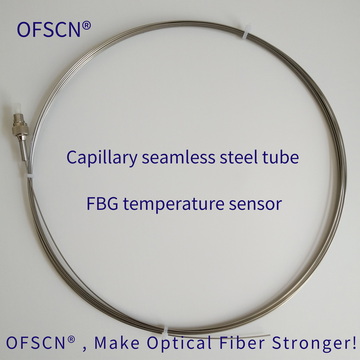Application of Fiber Bragg Grating Sensing Technology - Application of FBG Sensor - Application of FBG-Application of FBG Demodulator - Application of FBG Sensing in Industry
FBG Sensing Technology for Temperature Monitoring During the Refining process in Oil and Gas Industry
The oil and gas industry is a critical sector that is responsible for the extraction, transportation, and refining of crude oil and natural gas. The refining process involves heating crude oil to high temperatures, which transforms it into various useful products. Temperature monitoring is an essential component of the refining process, as it impacts the efficiency, safety, and quality of the final products. In this article, we will discuss the problems that fiber grating sensing technology can solve,and how Beijing Dacheng Yongsheng Technology Co., Ltd.(short for DCYS ) can support temperature monitoring during the refining process in oil and gas industry.
Fiber Bragg Grating Temperature Sensing Principle:
Fiber Bragg Grating (FBG) temperature sensing is based on the principle that the Bragg wavelength of a fiber grating changes with temperature. When the temperature changes, the refractive index of the fiber core changes, causing the Bragg wavelength to shift. By measuring the shift of the Bragg wavelength, the temperature of the sensing area can be accurately determined. FBG temperature sensors have many advantages, including high accuracy, stability, and repeatability, as well as immunity to electromagnetic interference and high-temperature environments.
Click the link below for more details:
Challenges in Temperature Monitoring during Refining in the Oil and Gas Industry
Temperature monitoring during the refining process of the oil and gas industry is a challenging task due to several factors. The process involves high temperatures and pressures, which can cause traditional temperature sensors to fail. Additionally, the harsh operating conditions can cause signal interference and damage to the sensors, leading to inaccurate measurements. Furthermore, the sensors must be able to provide real-time data to enable prompt corrective action to avoid potential safety hazards or equipment failure.


What Problems can be Solved by FBG Sensing Technology:
Fiber grating sensing technology provides several solutions to the challenges of temperature monitoring in the refining process of the oil and gas industry. FBG sensors are highly resistant to temperature and pressure, making them ideal for use in harsh environments. They also have a fast response time, providing real-time temperature data that can help optimize the refining process's efficiency and safety. Additionally, FBG sensors are immune to electromagnetic interference, which improves their accuracy and reliability.
Recommended fiber grating temperature sensors:
Beijing Dacheng Yongsheng Technology Co., Ltd.:
Beijing Dacheng Yongsheng Technology Co., Ltd.(short for DCYS) is a professional manufacturer of fiber grating sensors, fiber grating demodulators and system software. Specializing in the production of various fiber grating sensors, including temperature, strain, stress, displacement, vibration, shape sensors, etc. DCYS also produces fiber grating demodulators, and can customize and develop related application software.
Recommended fiber grating demodulator:
Product Alias: Fiber Bragg Grating Interrogator, FBG Interrogator, FBG Sensor Interrogator, Fiber Optic Grating Interrogator, Fiber Bragg Grating Demodulator, FBG Demodulator, Fiber Optic Grating Demodulator
This product is produced by DCYS, and it is a high-speed high-frequency fiber Bragg grating demodulator(Interrogator). The fiber grating demodulator is compatible with various specifications and models of OFSCN® fiber bragg grating sensors (temperature, strain, stress FBG sensors, etc.). It features adjustable port density (4, 8, 16 channels) and high-speed high-refresh rate capabilities.
DCYS Supports Temperature Monitoring During the Refining process in Oil and Gas Industry:
DCYS‘s FBG sensing technology can help the oil and gas industry solve temperature monitoring problems during the refining process, improving efficiency, and safety.

Other Points Need to Be Clarified:
In conclusion, fiber grating sensing technology provides an effective solution to the challenges of temperature monitoring during the refining process of the oil and gas industry. FBG sensors are accurate, reliable, and can operate in harsh environments, making them an essential tool for the oil and gas industry. Beijing Dacheng Yongsheng Technology Co., Ltd. can provide customized fiber grating sensing solutions to help optimize the refining process's efficiency and safety.
